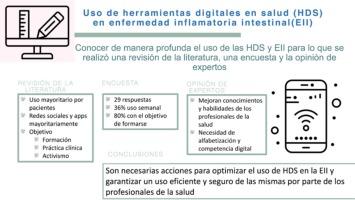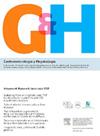Uso de herramientas digitales en salud en enfermedad inflamatoria intestinal
IF 2.2
4区 医学
Q3 GASTROENTEROLOGY & HEPATOLOGY
引用次数: 0
Abstract
Objective
To analyse the characteristics and use of digital health tools (DHT) in inflammatory bowel disease (IBD).
Methods
We performed a qualitative study based on a narrative literature review, a questionnaire and on the opinion of 3 expert gastroenterologists. Several searches were carried out until September 2022 through Medline to identify articles on the use of DHT in IBD by healthcare professionals. A structured questionnaire was designed to be answered by health professionals involved in the care of patients with IBD. The experts generated a set of recommendations.
Results
There are multiple DHT for IBD with different characteristics and contents. We received 29 questionnaires. Almost 50% of the participants were 41-50 years old, the majority were women (83%) and 90% were gastroenterologists. A total of 96% reported the use of several DHT, but 20% used them occasionally or infrequently. Web pages were found the most used (62%). DHT are mostly used to get information (80%), followed by clinical practice issues (70%) and educational purposes (62%). G-Educainflamatoria website is the best known and most used HDS (96% and 64%, respectively). The main barriers to the use of DHT in IBD were the lack of time (55%), doubts about the benefit of DHT (50%) and the excess of information (40%).
Conclusions
Healthcare professionals involved in the care of patients with to IBD frequently use DHT, although actions are needed to optimize their use and to guarantee their efficient and safe use.

在炎症性肠病中使用数字健康工具。
目的:分析炎症性肠病(IBD)数字健康工具(DHT)的特点和使用情况:分析数字医疗工具(DHT)在炎症性肠病(IBD)中的特点和使用情况:我们在文献综述、问卷调查和 3 位消化科专家意见的基础上开展了一项定性研究。截至 2022 年 9 月,我们通过 Medline 进行了多次检索,以确定医护人员在 IBD 中使用 DHT 的相关文章。设计了一份结构化问卷,供参与 IBD 患者护理的医护人员回答。专家们提出了一系列建议:结果:目前有多种治疗 IBD 的 DHT,其特点和内容各不相同。我们共收到 29 份问卷。近 50%的参与者年龄在 41-50 岁之间,大多数是女性(83%),90%是消化科医生。共有 96% 的人表示使用过几种 DHT,但有 20% 的人偶尔使用或很少使用。使用最多的是网页(62%)。DHT 主要用于获取信息(80%),其次是临床实践问题(70%)和教育目的(62%)。G-Educainflamatoria 网站是最知名和使用率最高的 HDS(分别为 96% 和 64%)。在 IBD 中使用 DHT 的主要障碍是缺乏时间(55%)、怀疑 DHT 的益处(50%)和信息过多(40%):参与护理 IBD 患者的医护人员经常使用 DHT,但仍需采取行动优化 DHT 的使用并确保其高效、安全地使用。
本文章由计算机程序翻译,如有差异,请以英文原文为准。
求助全文
约1分钟内获得全文
求助全文
来源期刊

Gastroenterologia y hepatologia
GASTROENTEROLOGY & HEPATOLOGY-
CiteScore
1.50
自引率
10.50%
发文量
147
审稿时长
48 days
期刊介绍:
Gastroenterology and Hepatology is the first journal to cover the latest advances in pathology of the gastrointestinal tract, liver, pancreas, and bile ducts, making it an indispensable tool for gastroenterologists, hepatologists, internists and general practitioners.
 求助内容:
求助内容: 应助结果提醒方式:
应助结果提醒方式:


